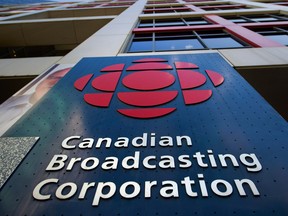‘It might make some conservatives feel better emotionally, but it’s not going to do anything for the culture of the country’ says Kenneth Whyte, National Post’s founding editor

Article content
Conservative Leader Pierre Poilievre and CBC CEO Catherine Tait are trading barbs about the continued relevance of the CBC. Among its fans, and even some foes, there’s much hand-wringing about Poilievre’s threat to shut down the English-language arm of the public broadcaster.
“I think the Conservative party has a lot of very valid criticisms of the CBC as it now stands,” nods the soft-spoken media stalwart Kenneth Whyte in a recent conversation. “And there are many more criticisms that you could make of the CBC beyond Pierre Poilievre’s concerns, which are mostly ideological.”
Advertisement 2
Article content
Notwithstanding, Ken’s not recommending a dismantling of the CBC.
“Personally, I think it would be irresponsible of a new conservative government to simply take an axe to the English-services budget and leave what is already a troubled and ineffective organization kind of bleeding at the side of the road,” Ken offers. “I don’t think that really accomplishes anything.”
“It might make some conservatives feel better emotionally,” he says with a smile, “but it’s not going to do anything for the culture of the country, for our understanding of Canada, for the ability of the various parts of the country to communicate with and understand one another, or even argue with one another. It’s just going to make things worse.”
Deep and wide experience in Canadian media, often in pioneering and leadership roles, gives this Winnipeg-born, Alberta-raised, 64-year-old bona fide insight into how the CBC finds its way back to relevance.
Ken was editor-in-chief of Saturday Night Magazine before he turned 35 years old, founding editor of the National Post, editor and publisher of Chatelaine, president of Rogers Publishing, and founding president of Next Issue Canada, a digital magazine service. In 2017, this media maverick launched Sutherland House, an independent, Toronto-based publishing house specializing in non-fiction books. Ken’s also the author of The Sack of Detroit: General Motors and the End of American Enterprise and The Uncrowned King: The Sensational Rise of William Randolph Hearst.
Article content
Advertisement 3
Article content
CBC is losing audiences and with good reason, Ken explains: “The fact that 40 per cent of the country is conservative and they can’t see themselves reflected in the national broadcaster at all is a real problem.”
Polling supports this phenomenon. An Angus Reid poll last summer reported 72 per cent of past CPC voters want to see CBC’s $1.2-billion subsidy from the federal government cut off. More broadly, polling shows one-quarter of Canadians want to shut down the state-owned broadcaster; one-third want to reduce CBC funding.
“The CBC talks all the time about diversity,” Ken laments, “but never about ideological diversity. I don’t know a single CBCer — and I know a lot of CBC people — who identifies as a conservative.”

Canada’s Heritage Minister, Pascale St-Onge, has set up an advisory group to modernize the CBC, ahead of the next election. “I’ve been following, reading about that panel,” Ken shares, “and frankly, it’s a bit of a joke.”
“It’s the same problem as everywhere else at the CBC,” he declares, with just a hint of edge in that still soft voice. “It’s almost entirely composed of the usual suspects. A lot of people who have been arts bureaucrats or CBC clientele in one way or another for a long time, and there wasn’t, again, a single conservative on the panel. The fact they don’t recognize the need to at least have a token,” he chuckles, “is really indicative of just how deep the rot is, both in Heritage and at the CBC.”
Advertisement 4
Article content
He steers the conversation to what can be done by a new government to fix a sector they complain about, incessantly, and remake it in a way conservatives think best suits the country. “If they do that,” Ken posits, “they’ll have a real lasting legacy.”
“If they (the CPC) just come in and cut $400 million out of the CBC budget, we’re just going to be waiting four or eight years until the Liberals come and put it back,” Ken cautions, “and nothing’s going to change.”
Instead, Ken hopes conservatives will say, “We’re going to write a better cultural policy for Canada. The Liberals have dominated this file as long as it’s existed. Since the 1950s, every major move on it pretty much has been made by a Liberal government and it’s really created in the Liberals’ image. And that’s bad for Canada. We need something that is far more representative and far more appealing to the Canadian people. Far more in keeping with today’s media environment.”
When the Liberals came to power nine years ago, Ken continues, he was optimistic about the possibility for modernization. He even agreed to sit on a panel put together by Mélanie Joly (the Trudeau government’s first heritage minister) to advise on the future of cultural policy in Canada. “The interesting thing around that table is there are people from kids television, there are people from performing arts, movies, conventional television and books, really a solid cross-section of people from the arts, different parts of the country, a really diverse group. And probably the one thing that all of them agreed on…was their disappointment with the CBC and what it had become.”
Advertisement 5
Article content
Joly wasn’t long in that portfolio, Ken recalls, but she did articulate many of the challenges facing both the CBC and the broader cultural sector — the fact we’re in a digital age and analog is no longer as important, and we’re in an age of global platforms where the old protectionist policies no longer work. Joly’s response was to say, we have to get better at exporting and developing content for the rest of the world and meeting the rest of the world on these global platforms. Ken says, “I’ve told a lot of friends who were in the Conservative party they ought to have stolen that; that ought to have been their cultural policy because it was forward-looking, it wasn’t protectionist, it was more commercially oriented and more accepting of the world as it is.”
Joly’s ideas for modernization ran afoul of cultural protectionists in Quebec, who weren’t friendly with global platforms. That was the end of Joly’s tenure in the ministry and that approach to cultural policy. “The Liberals have done nothing but sit on the lid of the Heritage Department since,” he laments, with a big squeeze of the stress ball in his hand.
Advertisement 6
Article content
Ken predicts we’re in for another decade or two of disruption in the media environment: “A lot of things we’ve come to rely upon disappearing; a lot of new things struggling to be born.” Having stability and resources within the CBC, by far the biggest presence in media in Canada, can help us bridge those two worlds, he suggests.
But the whole mandate of the organization has to be reconsidered.
CBC does everything now, says Ken, reeling off a long list of their programming: news, sports, scripted drama, reality TV, comedy, documentaries, kids programming, music and arts. “There’s no end to the things it does, and it does it on radio, it does it on television, mobile, podcasts, satellites and it’s got international services and all kinds of other distribution,” Ken adds. And it’s doing every function — production, distribution, marketing — across all of these mediums and platforms.
“When you try and do all the things they’re doing in one highly centralized, very hierarchical bureaucracy, it’s not a good environment for creativity or entrepreneurialism,” Ken concludes, “It’s the reason it doesn’t have an audience.” But if they unleashed a lot of that creative and entrepreneurial energy, and concentrated more on funding and developing rather than being the producer and controlling everything themselves, Ken suggests, “I think they could find a way back to relevance.”
Recommended from Editorial
Our website is the place for the latest breaking news, exclusive scoops, longreads and provocative commentary. Please bookmark nationalpost.com and sign up for our daily newsletter, Posted, here.
Article content







